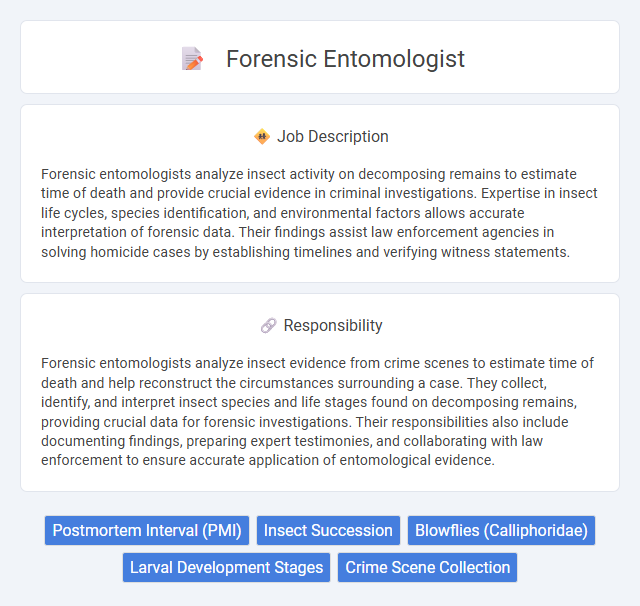
Forensic entomologists analyze insect activity on decomposing remains to estimate time of death and provide crucial evidence in criminal investigations. Expertise in insect life cycles, species identification, and environmental factors allows accurate interpretation of forensic data. Their findings assist law enforcement agencies in solving homicide cases by establishing timelines and verifying witness statements.
Individuals with a strong analytical mindset and keen observational skills are likely suitable for a forensic entomologist role, as the job involves studying insect evidence to determine time and circumstances of death. Those who are comfortable with biological sciences, working in sometimes unsettling environments, and handling decomposed remains may have a higher probability of success in this field. People who are easily disturbed by decay or lack patience for detailed scientific analysis might find the role less compatible with their temperament.
Qualification
A Forensic Entomologist typically holds a bachelor's degree in entomology, biology, or forensic science, often followed by a master's or doctoral degree specializing in forensic entomology. Expertise in insect lifecycle, decomposition stages, and environmental factors is essential for determining post-mortem intervals and assisting in criminal investigations. Strong analytical skills and experience with laboratory techniques, as well as collaboration with law enforcement agencies, are crucial qualifications in this role.
Responsibility
Forensic entomologists analyze insect evidence from crime scenes to estimate time of death and help reconstruct the circumstances surrounding a case. They collect, identify, and interpret insect species and life stages found on decomposing remains, providing crucial data for forensic investigations. Their responsibilities also include documenting findings, preparing expert testimonies, and collaborating with law enforcement to ensure accurate application of entomological evidence.
Benefit
A Forensic Entomologist likely provides critical benefits by utilizing insect evidence to estimate time of death, enhancing crime scene investigations. Their expertise may increase the accuracy of legal outcomes and support law enforcement in solving complex cases. Engaging this specialized knowledge could improve the reliability of forensic analysis and contribute to the justice system's effectiveness.
Challenge
Forensic entomologists likely face the challenge of accurately estimating postmortem intervals in varied and sometimes unpredictable environmental conditions. They might need to navigate complex insect life cycles and decomposition stages to provide reliable evidence in criminal investigations. The uncertainty inherent in biological factors and environmental variability could make their analyses particularly demanding.
Career Advancement
Forensic entomologists advance their careers by gaining specialized expertise in insect life cycles to assist in criminal investigations, often pursuing advanced degrees such as a master's or PhD in entomology or forensic science. With experience, they may progress to senior research positions, consulting roles for law enforcement agencies, or academic professorships, contributing to forensic casework, research, and teaching. Continuous professional development and publishing in scientific journals enhance their credentials and opportunities for leadership in forensic science organizations.
Key Terms
Postmortem Interval (PMI)
Forensic entomologists specialize in analyzing insect activity to accurately estimate the Postmortem Interval (PMI), which is the time elapsed since death. By studying the developmental stages of blowflies and other necrophagous insects on decomposing remains, they provide crucial temporal data for criminal investigations. Their expertise supports law enforcement by refining timelines and corroborating other forensic evidence.
Insect Succession
In forensic entomology, insect succession is crucial for estimating postmortem intervals by analyzing the predictable sequence of insect colonization on decomposing remains. Different insect species arrive in a specific order, starting with blowflies and followed by beetles, which provides vital temporal information for criminal investigations. Accurate interpretation of insect succession aids in reconstructing timelines and supporting legal evidence during forensic case analyses.
Blowflies (Calliphoridae)
Forensic entomologists specialize in analyzing blowflies (Calliphoridae) to estimate post-mortem intervals by studying the insect life cycle stages on decomposing remains. Blowflies are among the first insects to colonize a corpse, making their larval development patterns crucial for accurate time-of-death determinations in criminal investigations. Detailed knowledge of Calliphoridae species behavior and environmental influences enhances the precision of forensic analyses.
Larval Development Stages
Forensic entomologists analyze the larval development stages of insects found on decomposing remains to estimate the post-mortem interval (PMI). Precise identification of species and understanding the temperature-dependent growth rates of larvae such as blowflies provide critical temporal data for legal investigations. This scientific approach enhances the accuracy of crime scene timelines by correlating larval age with environmental conditions.
Crime Scene Collection
Forensic entomologists specialize in the collection and analysis of insect evidence at crime scenes to estimate post-mortem intervals and assist in criminal investigations. Precise sampling of insect specimens from various body areas and surrounding environments provides critical data for determining time and circumstances of death. Expertise in insect life cycles, species identification, and environmental factors enhances the accuracy of forensic interpretations in legal cases.
 kuljobs.com
kuljobs.com